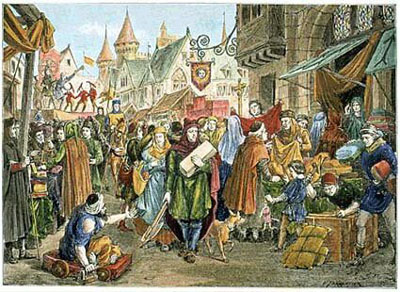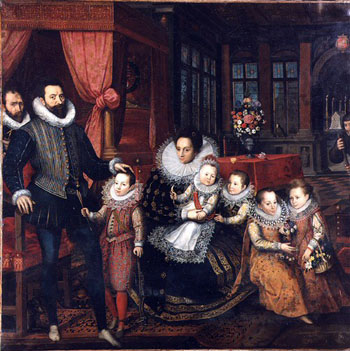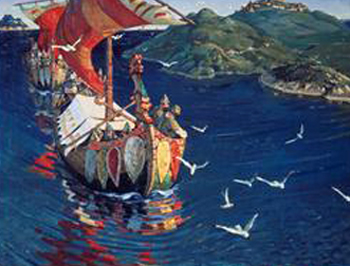 |
Organic Society
The Natural Candidate to Exercise Power
Plinio Corrêa de Oliveira
Having a position of power is not just a consequence of having money. Not everything in life relied on economics. In the past, for example, a feudal lord had the right to judge the people residing on his lands and to choose the municipal magistrates. He had, therefore, political powers.

The peasants kept the product of their lands to sell it in fairs |
From those same lands he received an insignificant amount of money that came from the system of emphyteusis, a long term rent contract, which we have already studied. Most of the of agricultural products and livestock would go to the peasants who were working those lands and producing those goods. If power were to come only from wealth, the feudal lord would not have power, because he did not receive large amounts of money.
Power should be considered an honor. Just to be a man is an honor; to have power over other men is still more honorable. In a certain way, it increases the dignity of the one who commands. It is more honorable to be a military officer than a soldier because the officer commands the soldier. It would be totally inaccurate to say that the officer commands the soldier because he receives a larger salary. This is not true. The truth is the opposite: he receives a higher salary because he commands.
Real leadership comes from service rendered to the community
Power or command is metaphysically a good. Normally it results from a great service rendered to the community. In the past, three or four families in a country represented the glory of that country, giving it great saints, generals, artists and men of good taste who helped the country acquire a civilized tonus. Should such a country become independent, the future king would normally be chosen from one of those families. It is service rendered that gives birth to leadership, and leadership normally merges with royalty.

The married couple Charles d'Arenberg & Anne de Croÿ, from two of the ancient houses in Belgian nobility |
In these conditions, leadership or royalty is considered a good per se and not a fruit of a certain economic situation. A norm like this would be wrong and undignified: “Whoever has the most money in a country, so long as he is the wealthiest, is the king.” Human nature would be insulted by this norm, because human society is not a commercial enterprise.
When Belgium became independent in the 19th century and removed itself from Austrian and Dutch domination, it constituted a kingdom. The independent regions that constituted Belgium had great families that were equal to most of the royal families in Europe: names like Arenberg, Ligne, Merode, Croÿ, Ursel, Caraman-Chimay, etc. I believe it was a mistake that the royal dynasty chosen to rule Belgium came from the Saxe-Coburg-Gotha family, which was a very small house of a secondary principality in Germany. It was an unjustified choice. One of the great Belgian families that had made the history of the country had the right to be chosen to be the royal dynasty.
I believe this was a revolutionary maneuver to prevent Belgium from having an organic monarchy strongly linked to its past. That choice created an artificial and unstable monarchy that is much more vulnerable to the bad influences of the Revolution.
How the leader in a new situation is born
When a society is sprouting and developing, it is like an organism where different organs grow.
When the Empire of Charlemagne fell, his imperial administration came to an end. The monarchs who succeeded Charlemagne were not capable of maintaining the centralized government he had established and maintained. Hordes of Normans and Vikings invaded the whole Empire. The weak successors of Charlemagne could not support those assaulted lands. Also, those invaders, principally the Vikings, were much more numerous.

Vikings invaded the Frankish Empire in large numbers |
The central power disintegrated and all that remained were those who owned lands in those regions. They built fortifications to protect themselves and their workers and, naturally became the commanders when they were attacked. These owners, then, came to exercise the role of governors. This system established itself organically almost everywhere, and when the invasions ended, Feudalism had been implanted throughout Europe.
This occurred by means of the organic principle that when the need for a higher position arises, the natural candidate to exercise its power is the man who had been closest to that function. The man does not rise to the position of power because of money. Money is also a factor, but there is a much more profound principle at play here than money.
Anyone who considers the economic factor as the principal motor of things does not understand that what influenced society in the Middle Ages was first and foremost the idea of honor, in great part born from Chivalry.
This noble idea of honor as the base of everything was strongly attacked by the Industrial Revolution, which aimed to replace that aspiration of society with the interest for money. Today this mentality has prevailed almost everywhere. This is why we must counter-attack it in order to restore a Catholic Civilization.

Posted January 4, 2013

  | | Prof. Plinio |
Organic Society was a theme dear to the late Prof. Plinio Corrêa de Oliveira. He addressed this topic on countless occasions during his life - at times in lectures for the formation of his disciples, at times in meetings with friends who gathered to study the social aspects and history of Christendom, at times just in passing.
Atila S. Guimarães selected excerpts of these lectures and conversations from the transcripts of tapes and his own personal notes. He translated and adapted them into articles for the TIA website. In these texts fidelity to the original ideas and words is kept as much as possible.

Related Topics of Interest
 Leadership Is Established by Generosity & Gratitude Leadership Is Established by Generosity & Gratitude
 The Organic Formation of Feudalism The Organic Formation of Feudalism
 How Intermediary Societies Participate in the State Power How Intermediary Societies Participate in the State Power
 The Dream of Catholic Empire and the Medieval Wars The Dream of Catholic Empire and the Medieval Wars
 Subsidiarity & Feudalism Subsidiarity & Feudalism
 The Organic Formation of a Region The Organic Formation of a Region
 Proportion between the City and the Man Proportion between the City and the Man
 The Peasant-Nobles of the Roncal Valley The Peasant-Nobles of the Roncal Valley
 A Participative Society A Participative Society

Related Works of Interest
|
|
Organic Society | Social-Political | Home | Books | CDs | Search | Contact Us | Donate

© 2002-
Tradition in Action, Inc. All Rights Reserved
|
 |
|